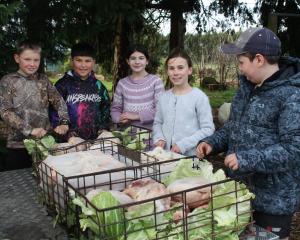In September, about 500 Onthophagus taurus and Onthophagus binodus beetles were released on a Tuturau dairy farm in a New Zealand first. Yesterday, 100 Geotrupes spiniger beetles, known as paua beetles, were released, half on a lifestyle property on the outskirts of Invercargill and the rest on a sheep and beef farm at Mataura.
Female dung beetles make dung balls, tunnel down into the ground and lay an egg into each dung ball. Hatched larvae eat their dung ball as they grow, turning the faeces into a sawdust-like material which becomes a soil fertiliser. Dung beetle activity improves soil health and aeration and reduces water and nutrient runoff. Grass roots grow deeper into the soil, which makes pasture more drought resistant.
The Tuturau beetles are about the size of house flies, while yesterday's variety, named for their metallic blue bellies, are more than twice that size.
''They're like cockroaches'', Mr Skerrett said.
Environment Southland senior biosecurity officer Randall Milne said each type of dung beetle had different preferences.
''The smaller ones like runny dairy cow dung and these ones like their dung more solid. They like horse and beef cattle poo, and sheep droppings, too. It's amazing what you learn in my job. I wouldn't have known that 10 years ago.''
Mr Skerrett, a Maori kaumatua who does some work for Environment Southland, said last year's release ''got his attention'' and when he heard the council was looking for somewhere to trial the larger paua variety, he offered his land.
''We have two horses and plenty of horse dung and these ones are more suitable for my property. At least, that's what we think.''
Mr Milne said the beetles would be covered with a plastic bin for a week, then monitored from time to time. The Tuturau beetles had ''gone to ground'', property owner Robin Greer said.
''We haven't seen much of them. With 500 in a 4ha paddock there are plenty of places for them to hide in.''
He had been told it was normal for the beetles to burrow and it could be months before he saw any signs of them above ground in the cow pats.












